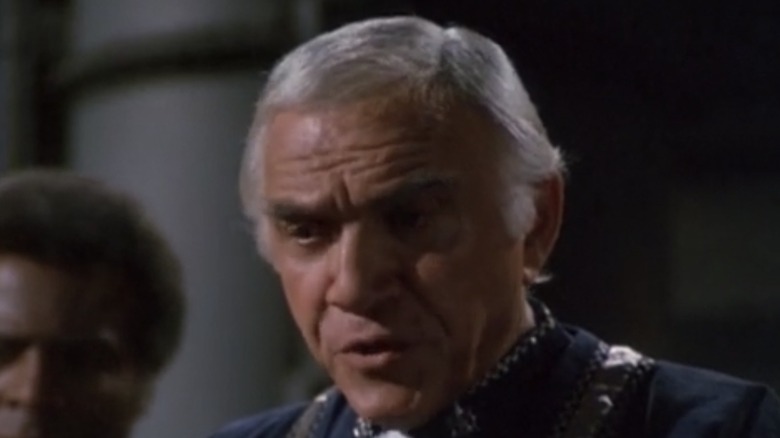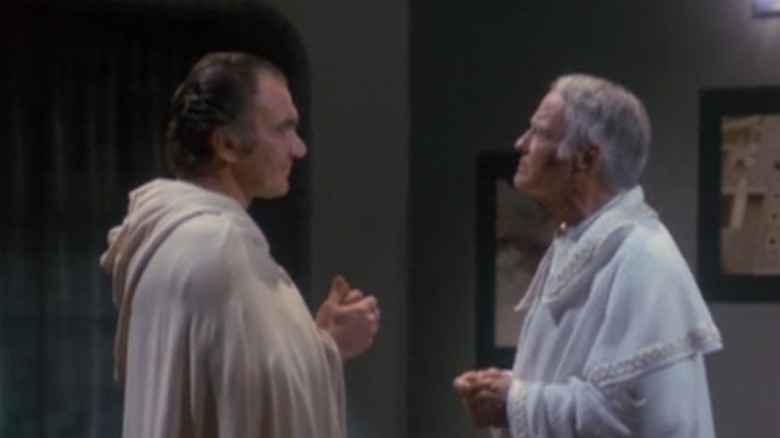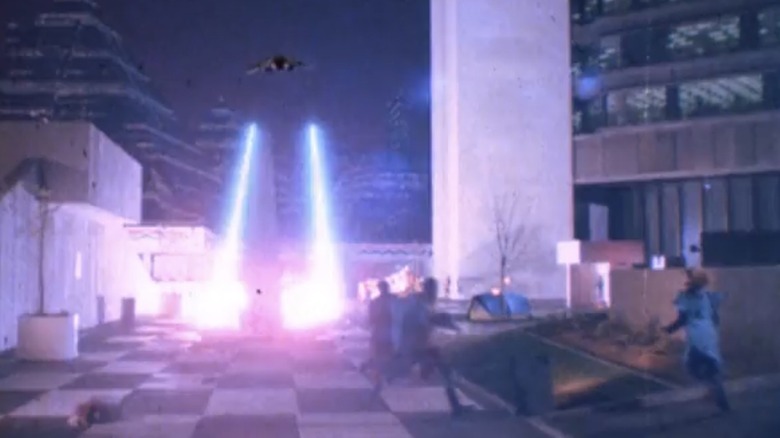Why The Original Battlestar Galactica Was So Controversial In Russia
We may receive a commission on purchases made from links.
In 1978, the high-profile television series "Battlestar Galactica" was originally branded as a "Star Wars" knockoff. In fact, the success of George Lucas' future franchise did help the show get on the air. The saga of Luke Skywalker also influenced the look and feel of the show's tale of 12 colonies, led by one military starship, fleeing the Cylon menace while searching for the planet Earth. Some of the people responsible for "Star Wars" even worked on "Battlestar Galactica," including Ralph McQuarrie, who did much of the TV show's concept art, and producer John Dykstra (via Marvel Super Special #8, as uploaded by blogger Joseph Dickerson). In fact, 20th Century Fox sued Universal Studios, MCA, and ABC based on various similarities, 34 of which were listed as part of the suit.
The original "Battlestar Galactica" became a cult classic that many critics and hardcore fans still love, even with SyFy's reimagining from 2004-2009 overtaking it in the hearts and minds of many TV viewers — no surprise, as it's totally binge-worthy. Inverse has lauded the '70s series for its "utter bravery and charm" and Tor.com called the show "ambitious and fantastic." Yet the comparison to "Star Wars" wasn't even the only controversy television show experienced during its single season of 24 episodes. As it turns out, the Russians disliked "Battlestar Galactica" as much as 20th Century Fox did.
Does Battlestar Galactica take sides in the Cold War?
You may remember that in 1978, the U.S. and the Soviet Union were engaged in the Cold War, which ultimately lasted 45 years following World War 2 and was marked not by outright military campaigns, but by a power struggle between communist and capitalist ideologies. According to History, the U.S. wanted to contain the U.S.S.R.'s expansion into Europe, Asia, and Africa, resulting in especially high stakes due to the proliferation of atomic weapons and the arms race. Back then, many Americans feared the prospect of a nuclear war between the two superpowers.
If you've seen the pilot of "Battlestar Galactica," you know the show starts out as Adar (Lew Ayres), president of the Quorum of the Twelve, is talking with Baltar (John Colicos), the Cylon's human liaison, about ending thousands of years of war between their two advanced civilizations. The 12 battlestars that represent each of the colonies of man are on their way to rendezvous with their long-standing enemy, who have sued for peace. No negotiations are actually shown, but Adar has gathered the Quorum together for a celebration.
Later, in a conversation with Commander Adama (Lorne Greene), a skeptical Adama tells Adar of the Cylons, "They hate us with every fiber of their existence. We love freedom, we love independence, to feel, to question, to resist oppression."
A Russian journalist criticized the show for its 'anti-Soviet symbolism'
When "Battlestar Galactica" debuted on September 17, 1978, it instantly invoked criticism from viewers in Russia. On the strength of these early scenes, journalist Melor Sturua of the Russian publication Izvestia said (as quoted in "Focus On: 100 Most Popular Television Series by Universal Television" and documented on fan sites), "The galactic negotiations between the people and the Cylons really resembled the U.S./Soviet SALT talks — not in their actual form but in the perverted interpretation of the enemies of the treaty from the family of Washington hawks ... Their inspiration is the pumping-up of military, anti-Soviet hysteria, which in this case is disguised in the modern costume of socio-scientific fantasy ... Anti-Soviet symbolism dressed in a transparent tunic of science fiction."
The SALT and SALT II talks took place starting in 1969 between president Richard Nixon and Soviet General Secretary Leonid Brezhnev and resulted in an agreement in 1972 that both countries would limit their amount of nuclear missiles. SALT II negotiations began late that year to resolve some lingering disputes. While both sides had agreed to a basic framework by 1974, outstanding issues remained into 1979, when the Soviet Union invaded Afghanistan right as American politicians were starting to balk due to Soviet crackdowns on internal dissent and other differences. SALT II was never ratified (via the U.S. Department of State).
In "Battlestar Galactica," the Cylons invaded the defenseless 12 colonies after having lured the colonial fleet into complacency with promises of peace delivered through Baltar. This began a genocide that eventually led the last pockets of humanity to band together to create the "ragtag fugitive fleet." Although viewers may be able to see some parallels between the events of "Battlestar Galactica" and the tensions between the two world superpowers in the 1970s, fortunately, real-life events did not end the same way.


